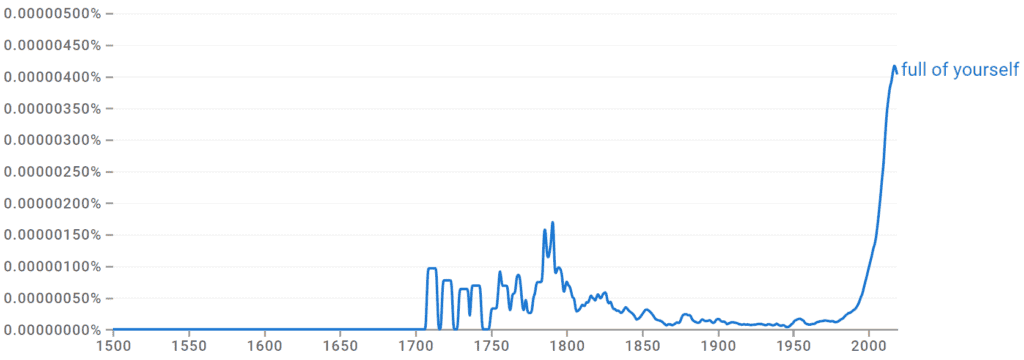If you’ve been told you’re full of yourself, it’s a colloquial way of saying that you’re overly self-centered or boastful, not that you’re overstuffed like a Thanksgiving turkey! But where did this expression originate? How should you use it? Sit with me for a moment while I break down this common idiom and show you how to properly use it.
Full of Yourself Meaning Explained

When someone is described as being full of themselves, it means that they have an inflated sense of self-importance or a conceited attitude. They might talk about themselves a lot, disregard others’ opinions, or boast about their abilities or achievements.
So, if someone accuses you of being full of yourself, they’re not complimenting your self-esteem but calling out your excessive self-pride. Make sure to avoid that!
Early in my career as a writer and author, I crossed paths with so many authors and people claiming to be experts in publishing. Years later, I see now how full of themselves they were.
The Origin and Etymology of the Saying Full of Yourself

There’s no definitive origin to pinpoint this phrase on, but it’s been part of English vernacular since the 1700s. It all comes from the idea that someone can be so consumed with their own thoughts, desires and self-image that they’re metaphorically filled to the brim with their own ego, leaving little room for others to shine.
Synonyms to Use Instead of Full of Yourself
If you’re searching for a different way to tell someone they’re a tad too self-centered, here are some alternative phrases you can use:
- Egotistical
- Arrogant
- Vain
- Conceited
- Self-absorbed
- Presumptuous
- Boastful
- Self-important
Any of these would work the same way full of yourself would in most contexts.
Examples of Full of Yourself in a Sentence

- “John, you’re so full of yourself! Not everyone wants to hear about your promotion again and again.
- She was talented, but I wish she wasn’t so full of herself.
- You may think he’s full of himself, but I believe he’s just confident.
- “Get over yourself! You’re so full of yourself,” she said to her bragging brother.
- He acted so full of himself after winning the competition that it made others uncomfortable.
- Despite her achievements and life-long career, my sister never became full of herself.
- The coach warned the star player not to get too full of himself and risk the game.
- She told him he was full of himself when he insisted he was the best singer in the choir.
- Listen, being full of yourself can deter people from wanting to get to know you.
- When you’re so full of yourself, it’s hard to consider others’ feelings.
Exiting the Echo Chamber
So, there you have it! Now you’re fully equipped to use the phrase full of yourself correctly. Just remember, it’s good to be confident but not so great to be full of yourself. Life’s a balance, after all, just like language! Keep things balanced with more idiom breakdowns like this one. I’ve got plenty!
Want to know more idioms? Check out some others we covered:
